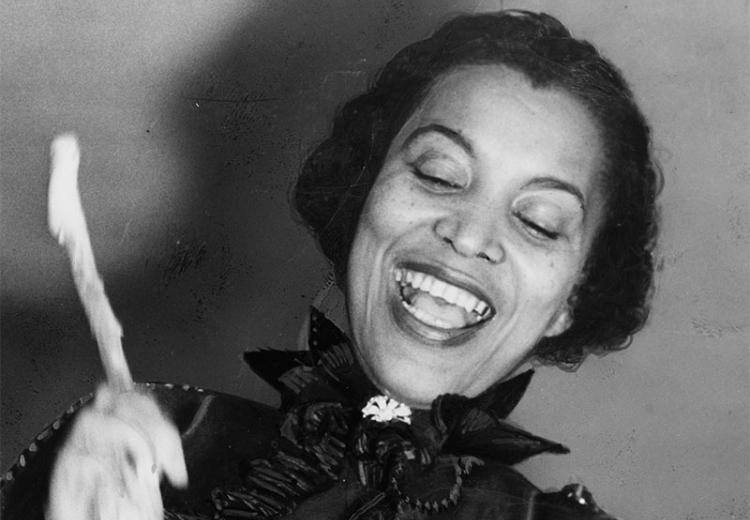Folklore in Zora Neale Hurston's Their Eyes Were Watching God

Zora Neale Hurston, beating the hountar, or mama drum.
In the years since Alice Walker's famous "rediscovery" of Zora Neale Hurston, Hurston's work has received new and richly deserved attention from high school English teachers. Hurston's work is lively, lyrical, funny, and poignant, but this consummate literary craftsperson was also a first-rate ethnographer, conducting fieldwork for Franz Boas, the father of American anthropology, and for the Works Progress Administration.
It is not surprising, then, that Hurston's fictional output sings (sometimes literally!) with the sounds, songs, and stories of the Southern black folk tradition. Their Eyes Were Watching God, often acclaimed as Hurston's masterpiece, makes perhaps the richest use of her work as a folklorist: its evocation of picking in the jook joint, playing the dozens, and petitioning root doctors offers a compelling synthesis of ethnological detail, lively characterization and vivid setting.
In tribute to Hurston's fusion of social science and authorial craft, this lesson plan focuses on the way Hurston incorporates, adapts, transforms, and comments on Black folklife in Their Eyes Were Watching God. Students will read the novel, explore Hurston's own life history and collection methods, listen to her WPA recordings of folksongs and folktales, and compare transcribed folk narrative texts with the plot and themes of Their Eyes. Along the way, the history of Black autonomy in the post-Civil War South (especially the town of Eatonville, where Hurston grew up and where much of the novel is set) serves as a potent reminder of the vital relationships among place, tradition, history, and story. In short, the idea of this lesson is to understand, both as formal analysts of voice and style and as historians of literature, the crucial role of oral folklore in Hurston's written canon.
Guiding Questions
What is the relationship between formal, individual literary creativity and the informal, traditional aesthetic standards of the writer's own community?
Learning Objectives
Define folklore, folk groups, tradition, and oral narrative
Identify traditional elements in Their Eyes Were Watching God
Analyze and understand the role of traditional folkways and folk speech in the overall literary impact of the novel
Compare Zora Neale Hurston's work as a collector of folk narrative with her better-known status as a novelist
Understand as both listeners and tellers the importance of voice, pacing, and other features of performance in oral narrative
Transcribe orally given narrative into eye dialect
